
Douglas Carswell
Submitted by Douglas Carswell
“Now that the dollar is merely a paper promise, issued by the Fed, the federal government is able to borrow almost at will.”
Fifty-one years ago this week, Richard Nixon made the most consequential decision of his presidency – and it had nothing to do with Watergate.
On August 15, 1971, Nixon announced that the US dollar could no longer be converted into gold. Up until that moment, the dollar was pegged to gold at $35 per ounce under what was called the Bretton Woods System. This international agreement committed the American government to backing every dollar overseas with gold.
“Big deal”, you might say. “What has some distant decision got to do with today?” Quite a lot, actually. It explains why government is big, inflation high, capitalism corrupted and why young Americans are voting left.
For as long as dollars could be converted into gold, there was a limit on the number of dollars that the US government could put into circulation. Why? Because someone might come along with dollars and ask to exchange it for gold. Once dollars could no longer be converted into gold, the US government was free to create as many dollars as it liked.
This is pretty much what has happened ever since.
Following Nixon’s announcement, the only thing restricting the amount of dollars that the government creates is the government. And governments, sadly, are not very good at saying “no” to themselves.
This has produced persistent inflation. Even before the latest price increases, there has been more inflation over the past half century than in all the previous history of the American Republic, including the Civil War and two world wars.
The amount of money in circulation has increased rapidly since Nixon made his announcement. Indeed, the past three years has seen an unprecedented surge in the number of dollars out there.
The United States was founded by rebels demanding “no taxation without representation”.
Thanks to Nixon’s decision, in order to raise revenue today the US government does not need permission from our representatives in Congress to raise tax. They can simply borrow instead.
The US government has had a budget deficit on 47 of the past 51 years. Now that the dollar is merely a paper promise, issued by the Fed, the federal government is able to borrow almost at will. I imagine George III would have looked at such a scheme with envy. No need to worry about taxing tea when you can borrow and spend billions at will.
Once the government is free to manipulate the currency to spend what it wants, it is also able to use monetary policy as a tool to steer the economy.
At first the government only manipulated monetary policy to direct the economy in extreme circumstances, such as when the stock market crashed in October 1987. The US Fed used monetary policy to ride to the rescue. They slashed interest rates to boost spending, cut savings and make shareholding more attractive to investors than holding cash.
A decade later, in the wake of the Asian financial crisis, the Fed did something similar. And then again with the collapse of LTMC, the world’s largest hedge fund. By the time the Fed used monetary stimulus in response to the dot com bubble bursting, or the collapse of Lehman bank, it was almost expected.
When Covid came, monetary stimulus in the form of low rates and QE was not a temporary measure. It had become a constant – but one that has begun to corrupt capitalism.
Years of low interest rates and artificially easy money has caused all sorts of problems. Easy money means that asset prices have been inflated. The explosion of asset values benefits those with assets (often older) over those without (the young). (Ever wondered why so many young Americans vote left and say they are skeptical about free-market capitalism?)
Real wages have stagnated. (Ever wondered why blue collar America often seems so angry?)
You might not be able to see it right now, but an awful lot of bad investments have been made, with many ‘zombie’ companies – firms that are able to service their debts but not pay off the principle.
The ‘Nixon shock’ caught America by surprise in August 1971 but was soon overshadowed by Watergate. Half a century on, it seems that sanctioning a burglary was not the worst decision Nixon made in the Oval Office.
Where does all this leave conservatives today?
If we are serious about reducing the size and reach of government, we cannot remain part of the Greenspan-to-Powell consensus. A future conservative President and Congress are going to have to, at the very least, redefine the Fed’s terms of reference.
Nothing lasts forever, and certainly not paper promises.
###
Submitted by Douglas Carswell. He is the President and CEO of the Mississippi Center for Public Policy.











